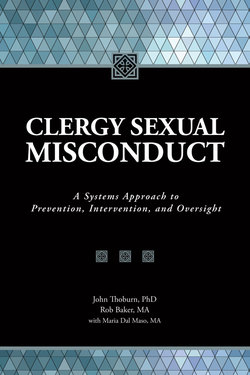Читать книгу Clergy Sexual Misconduct - John Thoburn Thoburn - Страница 9
На сайте Литреса книга снята с продажи.
A Systems Approach
ОглавлениеPast research and writing on clergy sexual misconduct has focused on the minister’s behavior, attitudes, and personality. However, the most efficient way to understand and mitigate against clergy sexual misconduct is to recognize dynamics for ministers within their professional contexts (Benyei, 1998; Johnston, 1996; Thoburn, 1991). Keep in mind that ministers are individuals imbedded in nested systems that involve their immediate families, Church communities, and conferences or synods. Ministers, therefore, live and work within an ecology of relationships. The contextual world of a minister consists of these parts:
1.Intrapersonal, how a person is connected to self
2.Interpersonal, how a person is connected to others
3.Environmental, how a person is connected to his or her community and the world. Ecology of relationships refers to the social embedding that occurs within nested environmental systems from the micro-level individual to the meso-level family to the macro-level global community (Bronfenbrenner, 1979; Stanton, 2009).
A systems paradigm further delineates the rules that govern systems. These systems embody a sense of reciprocity where each member of a system, as well as each system, influences one another. The intrapersonal world of the pastor is shaped by internal neurological wiring and connection with one’s personal core beliefs, attitudes, and feelings. These beliefs, attitudes, and feelings are shaped by the interpersonal world of his upbringing and reinforced by his spouse, family, church staff, and members of the congregation. The pastor’s intrapersonal and interpersonal life is also impacted by the environmental constraints and conventions of the denominational system in which he works and the greater culture in which he lives.
Figure 1.1: Design for Integrated Personal and Relational Health
A systems perspective is grounded in the idea that God is the God of relationship. The first name for God in Genesis is Elohim. He is the Strong One who is Many; He is in relationship with Himself as Father, Son, and Holy Spirit; and He created us for the purpose of relationship with Himself and with each other. Human beings are conceived out of, born into, and develop from relationships. Ill health is related to damage or brokenness in the ecology of these relationships, resulting in a life that is unbalanced, unfocused, and disintegrated. An unbalanced life is one that is unrealistic, sheltering one’s self from real or perceived stressors through rigidity in cognitions, feelings, and behaviors (depressive or anxiety disorders), or falling into chaotic ways of relating to the world (addictive, personality, or psychotic disorders (Siegel, 2007). An unfocused life is one that is caught up in the life of the past with its regrets or wrapped up in the life of the future with wishful thinking or fears, rather than meaningfully attending to life in the here and now. Disintegration is defined by reactivity to real or perceived fears, an inability to appropriately recognize or differentiate between self and the environment (others), and concomitant attempts to control the environment (relationships with others) through manipulation and deception (the indiscriminate use of guilt, shame, and fear against self and others). Integrated health, that is balanced and focused, is born out of reconciliation with self, others, and God, forming the basis for our understanding of Christ’s work—that of reconciling the world to God, as stated in 2 Corinthians 5:19. Our understanding of Christ’s work of reconciliation is reflected in a culture of recovery that is based on the belief that redemption and restoration of relationship is possible for pastors, their families, current or former congregations served, and the denominations for whom they have worked.
Over the years, a singular focus of working with sexual misconduct has been on treatment; however, treatment is costly, labor and time intensive, and is akin to closing the barn door after the horses have escaped. A systems paradigm moves us far beyond focusing on treatment considerations alone, to include considerations of prevention, education, spiritual formation and direction, and relationally based supportive oversight structures. More on prevention, spiritual formation, and oversight will be discussed in the next chapter. A comprehensive systems model that integrates personal and relational health, balance, and focus dynamics, imbedded in a theology of a reconciliation, is vital for addressing this complex and stubborn issue. When this holistic approach is executed effectively, it gives rise to a formidable mitigation against clergy sexual misconduct.
